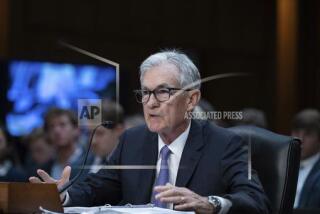Greenspan Hints Fed May Not Need to Raise Rates
WASHINGTON — Federal Reserve Chairman Alan Greenspan hinted in a speech Thursday night that the Fed won’t raise interest rates again in the coming weeks if the very rapid pace of economic growth early this year slows as he expects.
Greenspan and other Fed officials have been predicting such a slowing, and a number of private economists said Thursday it appears to be occurring. After running at a torrid 5.6% inflation-adjusted rate in the first quarter, growth may drop to a 2% rate or less in the April-to-June period, they said.
The Fed chairman, in remarks prepared for an awards dinner at New York University’s Stern School of Business, strongly defended the decision by central bank policymakers to raise short-term rates by a quarter of a percentage point in March even though there were no signs that inflation was increasing. He called the move “a form of insurance” against the possibility that growth might remain so high that it would cause inflation to accelerate later this year. A copy of the text was made available here.
“There is scant evidence of any imminent resurgence of inflation at the moment,” Greenspan said, but with unemployment now below 5%, “there also appears to be little slack in our capacity to produce. Should the expected slowing in the growth of demand fail to materialize, we would need to address any emerging pressures in product and credit markets.”
For the Fed, addressing “emerging pressures” means raising interest rates. But if growth does slow as expected, Greenspan appeared to be saying, higher rates will not be necessary.
However, there are still several key economic statistics to be released before the Fed’s next policymaking session May 20, including information about retail sales and changes in consumer and producer prices for last month. If there are any major surprises in those figures, they could affect the decision on rates, analysts said.
More to Read
Get the L.A. Times Politics newsletter
Deeply reported insights into legislation, politics and policy from Sacramento, Washington and beyond. In your inbox three times per week.
You may occasionally receive promotional content from the Los Angeles Times.










